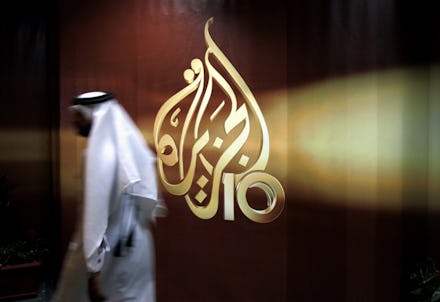Al-Jazeera becomes a target amid Qatar diplomatic crisis

Amid a worsening diplomatic crisis, four Arab states boycotting Qatar are demanding that the country shut down its state-owned media company, Al-Jazeera, and its affiliates.
The demand came as part of a steep, 13-point list from the governments of Saudi Arabia, the United Arab Emirates, Bahrain and Egypt. The countries, along with Yemen and the Maldives, abruptly cut diplomatic ties with Qatar on June 5 and imposed economic sanctions on the country, accusing it of supporting terrorism. Qatar has denied that it supports terrorism.
The list of demands also includes requirements that the country shut down a Turkish military base, cut any alleged ties with extremist organizations and scale back its diplomatic relationship with Iran.
The countries are demanding that Qatar "end interference in sovereign countries' internal affairs," including communicating with political opposition in the four countries, according to a full list of the demands published by Al-Jazeera.
Qatar has 10 days to meet the demands before the list becomes void.
It’s unlikely that the demands, which the countries have accused Qatar of intentionally leaking to the press to undermine negotiations, will be accepted. On Monday, Qatar Foreign Minister Sheikh Mohammed bin Abdulrahman al-Thani said the country would not negotiate until diplomatic relations were restored and the boycott was halted, according to Reuters.
In a statement provided to Mic, the Al-Jazeera Media Network said that the demand to shut down the company was nothing short of "a siege against the journalistic profession and the freedom of expression."
"We in the Network believe that any call for closing down Al-Jazeera is nothing but an attempt to silence the freedom of expression in the region and to suppress people's right to information and the right to be heard," the statement read. "We assert our right to practice our journalism professionally without bowing to pressure from any government or authority and we demand that governments respect the freedom of media to allow journalists to continue to do their jobs free of intimidation, threats, and fear mongering."
The network added that it remains "determined and resolute to continue our courageous journalism, reporting frankly, fairly and truthfully from around the world."
Al-Jazeera, one of the most influential and controversial news organizations in the Middle East, has long been a point of political tension. In some places in the Middle East, the satellite network, which is partly funded by the Qatari ruling family, was the first widely available non-government-owned broadcaster, making it a longstanding thorn in the side of some governments. Coverage on the network has even prompted some diplomatic crises over the years.
Al-Jazeera’s wide reach, aggressive coverage of civil unrest and sometimes controversial political leanings has made the company a target both inside and outside the region. The channel has been credited with amplifying protests that led to uprisings in Libya, Tunisia and Egypt, and it was heavily criticized by members of former President George W. Bush’s administration after it showed graphic images from the U.S. invasions of Iraq and Afghanistan, which was labeled "anti-American propaganda." It's also faced heavy criticism for its coverage of Israel and Palestine conflicts.
The channel first emerged in the late 1990s out of the wreckage of a failed Arabic-language television partnership between the BBC and a Saudi Arabian company, and it has grown to include dozens of bureaus and several sister networks around the world — including online-only channel AJ+ and the now-defunct Al-Jazeera America. Al-Jazeera maintains that it is editorially independent from the Qatari government, although that has been contested by critics.
Earlier this month, Al-Jazeera said that it was being targeted with hacking attempts, days after CNN reported that hackers pushed out a fake news report through the Qatar News Agency to heighten tensions.